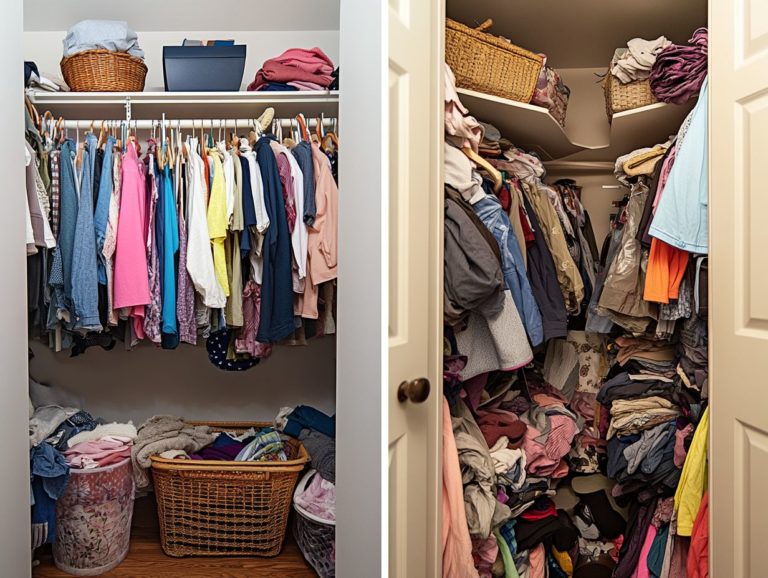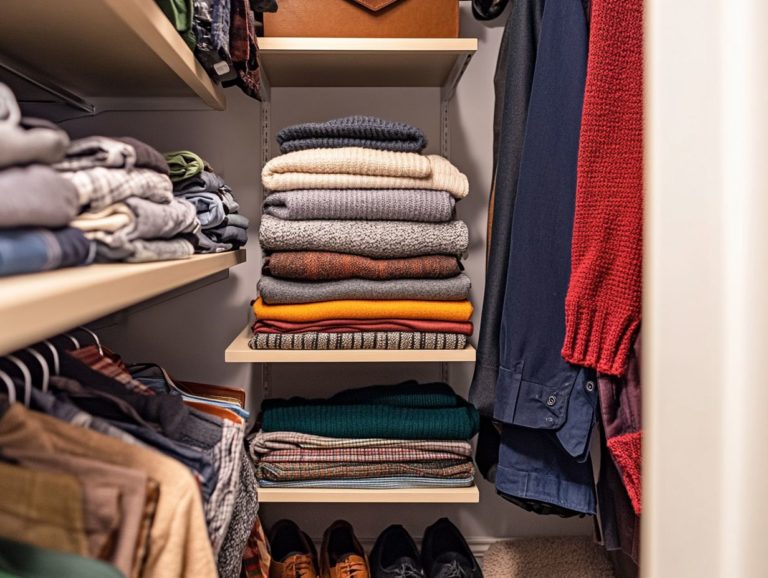The Environmental Impact of Closet Clutter
A cluttered closet does more than hide your favorite shirt; it can take a toll on your mental health and contribute to environmental issues.
As you delve into the consequences of closet clutter, you’ll uncover its impact on both your well-being and the planet.
Get ready to transform your space! This guide will show you how to declutter your closet with sustainable tips.
Explore the myriad benefits of a tidy wardrobe and learn how to sustain that pristine organization!
Contents
- Key Takeaways:
- The Consequences of Closet Clutter
- How to Declutter Your Closet
- Benefits of Decluttering Your Closet
- Sustainable Closet Organization
- Frequently Asked Questions
- What is the environmental impact of closet clutter?
- How does closet clutter contribute to resource depletion?
- What are the consequences of excessive waste from closet clutter?
- Does closet clutter have an impact on climate change?
- How can reducing closet clutter help the environment?
- What are some sustainable alternatives to dealing with closet clutter?
Key Takeaways:
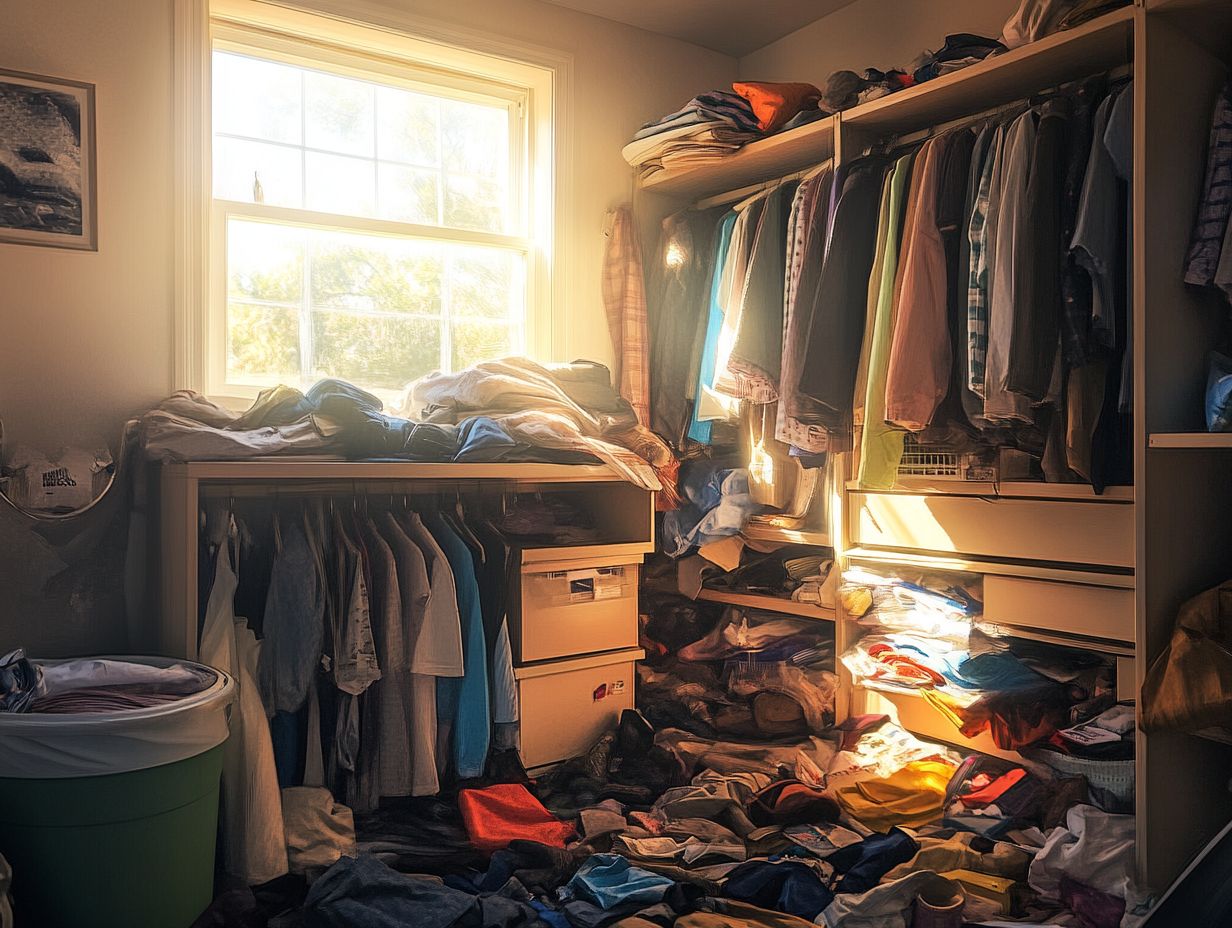
- A cluttered closet can have negative effects on both mental health and the environment.
- Decluttering your closet step-by-step can lead to improved mental well-being and reduced environmental impact.
- Maintaining a clutter-free closet through sustainable organization can positively impact both personal and global levels.
The Consequences of Closet Clutter
Closet clutter transcends mere inconvenience; it can profoundly affect your mental health and overall well-being. An unkempt closet often breeds feelings of overwhelm and anxiety, creating a chaotic atmosphere that stifles personal growth.
The emotional ties to items you no longer need can form emotional hurdles, complicating the decluttering process. Engaging in mindfulness practices enables you to confront these attachments and alleviate stress.
This journey ultimately paves the way for a healthier, clutter-free space that invigorates your energy levels and fosters a minimalist mindset.
The Effects on Mental Health
The impact of clutter on your mental health can show up in various ways, including heightened stress, anxiety, and an overwhelming sense of chaos. This cluttered environment may serve as a constant distraction, making it challenging to concentrate on tasks.
It ultimately diminishes your productivity. The accumulation of items often reflects unresolved emotional issues, creating a cycle of emotional distress, especially when you feel trapped by your surroundings.
To combat these negative effects, incorporating mindful practices like regular decluttering sessions can cultivate a sense of control and accomplishment in your life. Setting aside time each week to clear a small area can bring clarity and enhance your emotional well-being.
Techniques such as deep breathing, journaling about your feelings toward clutter, and practicing gratitude for the space you aspire to create can significantly reduce stress and encourage personal growth.
Environmental Impact
The environmental impact of closet clutter reaches far beyond just your mental well-being; it significantly adds to clothing and packaging waste.
When you accumulate excess clothing, it’s easy to overlook the broader implications of your choices on the planet. This surplus not only fills up landfills where synthetic materials can take centuries to decompose but also contributes to increased energy consumption and greenhouse gas emissions during production and transportation. Understanding the impact of a decluttered closet on lifestyle can help you make more conscious decisions.
By embracing sustainable disposal methods, like donating or recycling your garments, you can play a crucial role in alleviating these adverse effects. Making eco-conscious choices such as prioritizing quality over quantity and selecting sustainable brands gives you the power to reduce waste and promote a healthier environment for generations to come.
How to Declutter Your Closet

Embarking on the decluttering journey can feel liberating and overwhelming, yet with a few strategic steps, you can create a closet that embodies a minimalist mindset.
Start by evaluating your emotional attachment to each piece, assessing whether it truly adds value to your life. Establishing a thoughtful inventory organization system is essential; it allows you to categorize items and make informed purchasing decisions in the future.
Consider engaging with community recycling initiatives or charitable organizations to responsibly part with items that no longer serve you.
Don t wait any longer! Take control of your clutter to boost your well-being today.
Step-by-Step Guide
Creating a schedule and setting clear goals is the first step in transforming your closet into a more organized space.
- Start by evaluating your current inventory. Identify essential items and decide which can be let go.
- Next, categorize your clothing and accessories into three groups: keep, donate, and discard. This method simplifies organization and decision-making.
For donations, consider local shelters or thrift stores that prioritize environmentally friendly methods. This ensures your unwanted items find new homes instead of ending up in landfills. To better understand how to tackle clutter, explore the psychology behind closet clutter. Discover creative ways to repurpose damaged clothing, turning your decluttering journey into an eco-conscious endeavor that embraces minimalism while rejuvenating your space.
Benefits of Decluttering Your Closet
The advantages of decluttering your closet go beyond just tidiness. They significantly enhance your mental well-being and contribute to a positive environmental impact.
Creating a clutter-free space can transform your life! It elevates the aesthetics of your surroundings and fosters personal growth and clarity.
Improved Mental Well-being
Improved mental well-being is a key benefit of decluttering. A clutter-free space leads to lower stress levels and enhances mindfulness.
When you organize your surroundings, your mind feels lighter and more focused. This transformation is not just about looks; it creates a serene environment that promotes clearer thinking and fosters creativity. Incorporating mindfulness practices like meditation or deep breathing exercises in your organized space amplifies these positive effects.
A tidy atmosphere combined with mindful practices can create a sanctuary that nurtures your mental health, making daily stresses feel manageable.
Reduced Environmental Impact
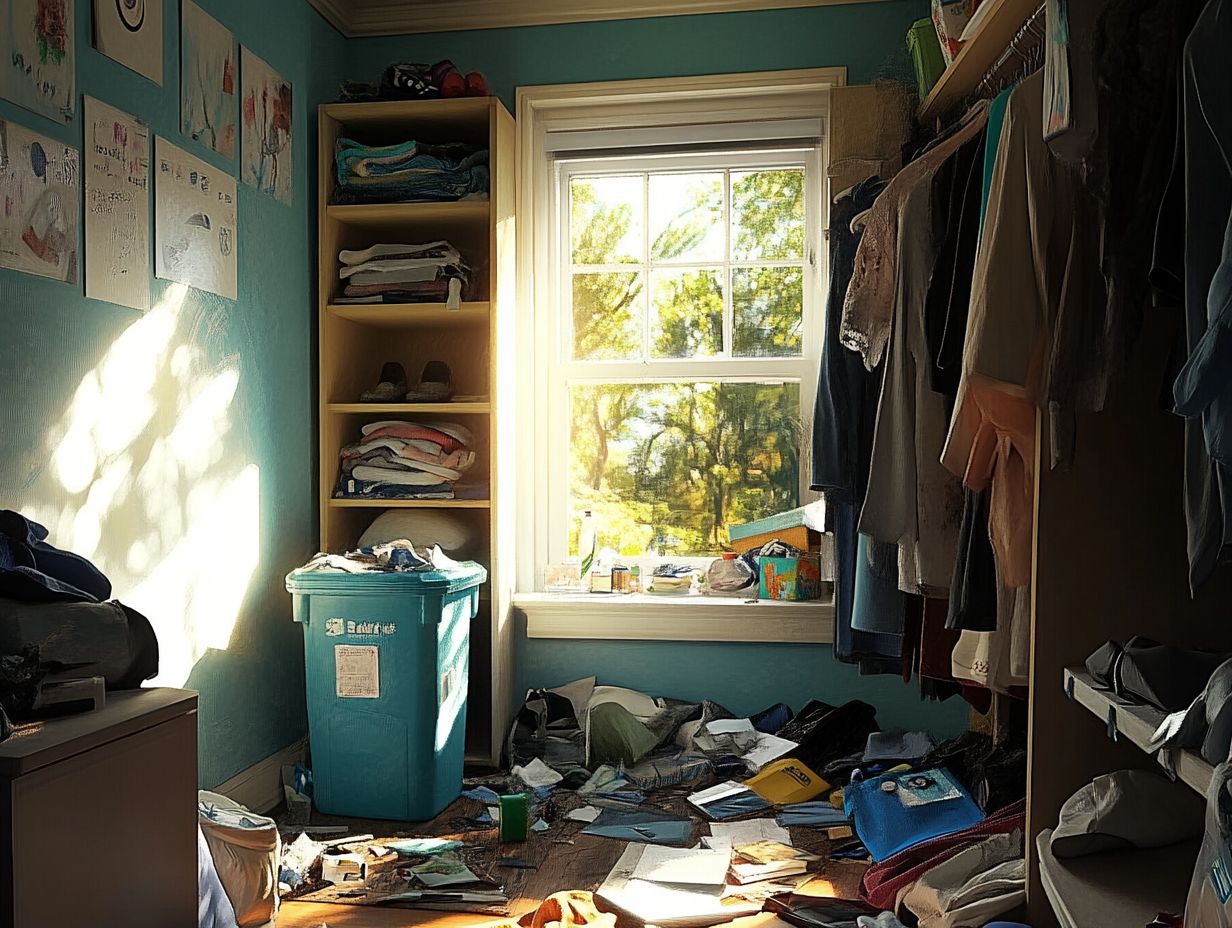
Reducing your environmental impact is another compelling reason to declutter your closet. Make eco-conscious choices that support sustainability.
By examining each item in your wardrobe, you can discover how to easily recycle or donate garments instead of sending them to landfills an essential step since textile waste significantly contributes to pollution. Opt for sustainable disposal methods, like donating to local charities or using recycling programs, ensuring your clothing is repurposed rather than discarded.
Adopting responsible habits such as investing in higher-quality garments made from eco-friendly materials not only reduces waste but encourages brands to prioritize sustainability. This collective shift fosters a more environmentally responsible society, one thoughtful wardrobe decision at a time.
Sustainable Closet Organization
Sustainable closet organization is essential for achieving a clutter-free environment. By embracing eco-friendly shopping choices, you enhance your space and align your wardrobe with your values for the long haul.
Start decluttering today for a healthier mind and planet!
Ready to transform your closet? Let’s dive into some practical strategies!
To cultivate a clutter-free closet, consider embracing a few elegant strategies that promote minimal living and encourage mindful consumption.
One effective approach is to conduct a thorough inventory of what currently occupies your closet. Take the time to assess each item and determine its true value in your wardrobe. This process will help you spot unnecessary duplicates and highlight pieces you rarely wear. It allows for a more thoughtful selection.
Making mindful purchasing decisions can further elevate your closet’s organization. Before you welcome a new item into your collection, ask yourself if it complements at least three existing pieces.
Embracing a shopping ban for a designated period can be quite transformative. It encourages reflection on your current needs versus your desires. Ultimately, this leads to a more intentional and curated collection.
Grab a bag and get started. Your clutter-free closet awaits!
Frequently Asked Questions
What is the environmental impact of closet clutter?
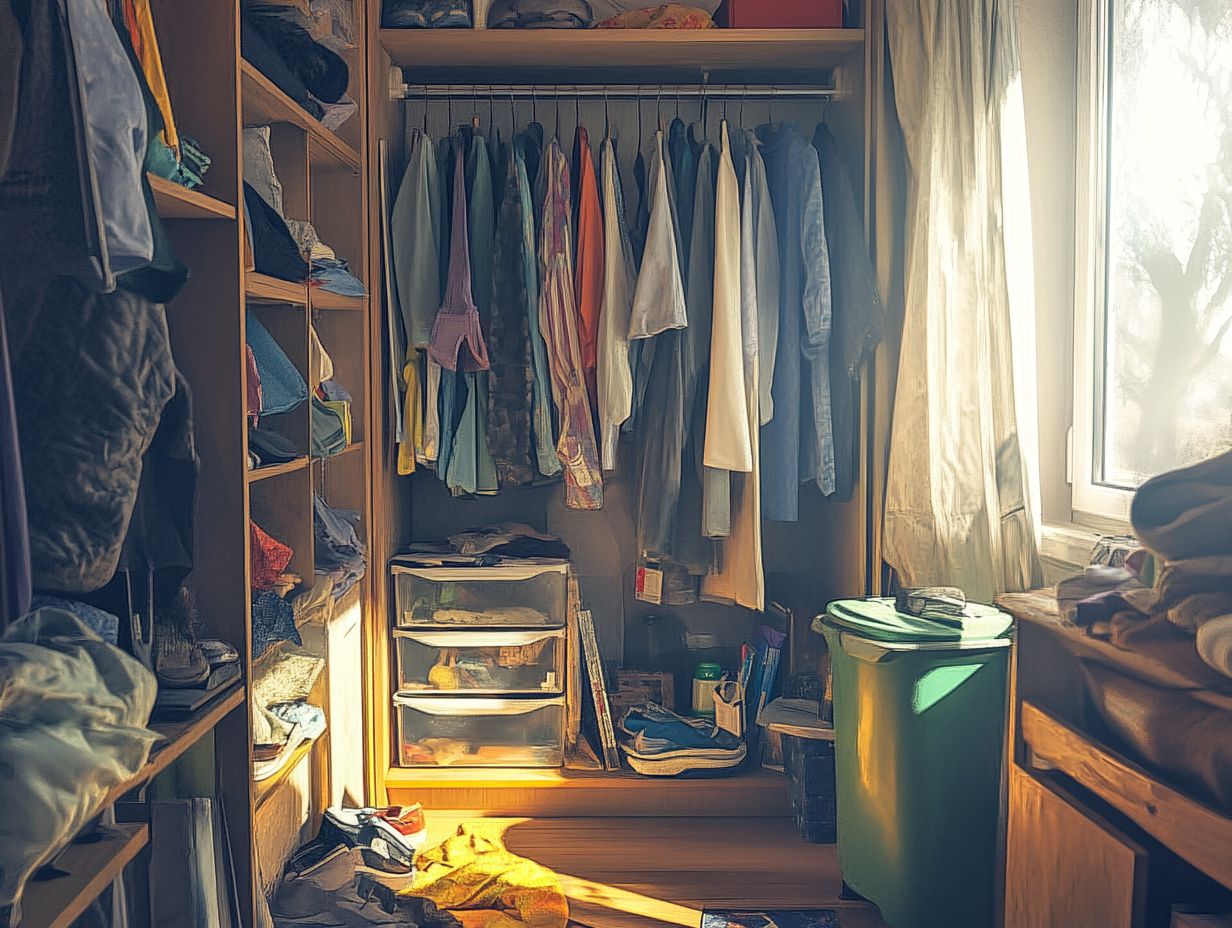
The environmental impact of closet clutter refers to the negative effects that excessive accumulation and disorganization of clothing and other items can have on the environment. This includes the depletion of resources, increased waste and pollution, and contribution to climate change.
How does closet clutter contribute to resource depletion?
Closet clutter often leads to unnecessary purchases of new clothing and items. This requires the use of natural resources such as water, energy, and land. The production of new goods contributes to resource depletion and can have devastating effects on the environment.
What are the consequences of excessive waste from closet clutter?
The overconsumption and disposal of clothing and other items contribute to the growing problem of waste. This waste ends up in landfills, where it can take years to decompose and release harmful greenhouse gases into the atmosphere. It also pollutes our waterways and harms wildlife.
Does closet clutter have an impact on climate change?
Yes, closet clutter contributes to climate change in several ways. The production of new goods requires energy, often sourced from non-renewable sources, which releases greenhouse gases. The disposal of clothing and items also produces methane, a potent greenhouse gas, in landfills.
How can reducing closet clutter help the environment?
By reducing closet clutter, we decrease the demand for new goods and production, thereby conserving natural resources. Reducing waste also helps to mitigate the negative effects of climate change. Organizing and cleaning out our closets helps us use the items we already have more effectively, reducing the need for new purchases.
What are some sustainable alternatives to dealing with closet clutter?
Instead of simply throwing out unwanted items, we can donate them to charities or secondhand stores. This reduces waste and gives these items a second life. We can also explore sustainable fashion options, such as buying secondhand or choosing clothing made from eco-friendly materials.
In summary, addressing closet clutter not only improves your space but also contributes positively to the environment.



